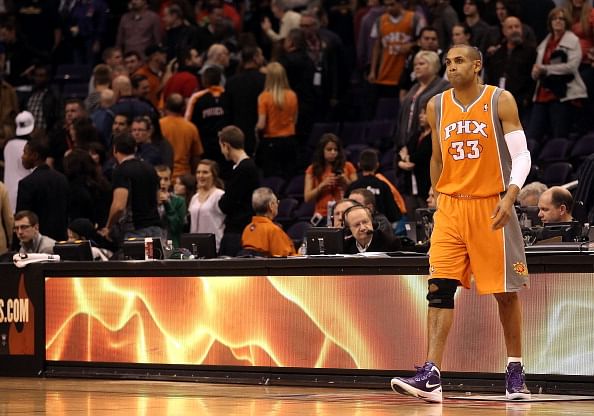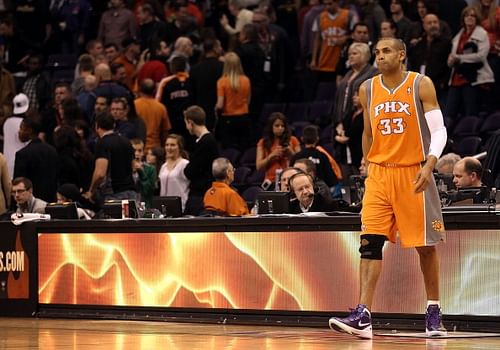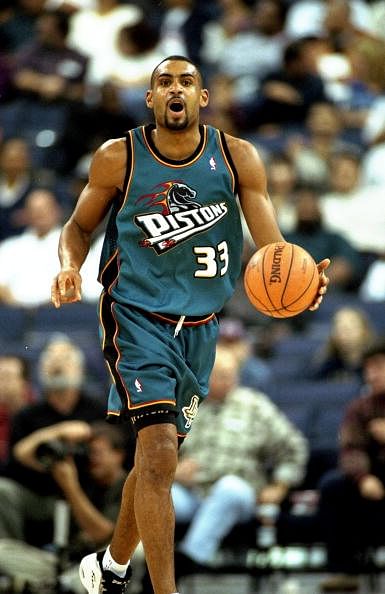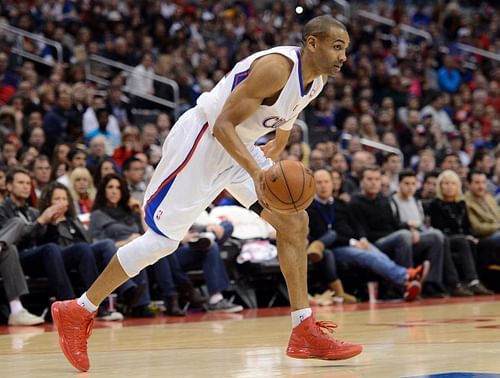
Grant Hill: Legend, interrupted

Grant Hill #33 pictured here during his time with the Phoenix Suns in 2011. He announced his retirement on June 1, after 19 years in the league. (Getty Images)
There are two sides to this story.
First, there is the glass half-empty. The pessimist’s side of the tale:
April 15, 2000. 7 days before the start of the playoffs, one of the best players in the NBA – Grant Hill – sprained his left ankle. He played though the pain for a few more weeks, but it wasn’t until the Game 2 of the First Round series against the Miami Heat that he was forced to leave the game. His team was swept. And a niggling injury was born.
Hill signed with the Orlando Magic over that offseason as the league’s most in-demand free agent. Unfortunately, his time in Orlando was ill-fated with injuries. He never fully recovered from that left ankle, and only played 37 games over the stretch of his first three seasons with the Magic, and was forced to sit out his entire fourth season with them.
By 2003, his ankle had been re-fractured and he had contracted a potentially fatal methicillin-resistant Staphylococcus aureus (MSRA) infection. He was hospitalised. He was told he would never play again, much less ever be play at the All-Star level that he had once been famous for.
Aaah! Talking about All-Star level, the rookie from Duke came into the league with the reputation as one of the greatest NCAA players in college history. That small forward was picked third by the Detroit Pistons and went on to win the co-rookie of the year award with Jason Kidd in 1994-95. The first rookie in any US sport to be voted into the All-Star team. As a matter of fact, he led the fan ballot in votes. Yes, he was that famous. He made the All-Star team seven times, including in 2001 when he was voted in despite being injured and in 2005, when he made a valiant comeback (more on that later). He was an All NBA First Teamer once and Second Teamer four times, all in just the first six years of his career in Detroit.
Hill was the first ‘Next Michael Jordan’; the first player that we believed would carry the league into its exciting future once Jordan retired. Allen Iverson, Kobe Bryant, Vince Carter, Tracy McGrady and LeBron James were handed the baton only when it slipped out of Hill’s hands. Here was a guy who played like LeBron when LeBron was still in Elementary School. He was the league’s ultimate point forward – along with Scottie Pippen – leading the offense from the small forward position and being a threat to lead his team in points, rebounds, and assists, night after night. During his first six seasons in Detroit, before he got hurt, Hill averaged 21.6 ppg, 7.9 rpg, and 6.3 apg, on 48 percent shooting. He was the most fluid player in the league (that should’ve been his nickname). From a stretch from 1997-99, he led the Pistons in points, rebounds, and assists three times. He led the league in triple doubles two years in a row and was the NBA’s third-leading scorer in 2000 with a career-high 25.8 ppg to go with 6.6 rebounds and 5.2 assists.

Hill, pictured here in 1998, during his time with the Detroit Pistons. (Getty Images)
He was the chosen one: an exciting and unstoppable talent, at 27 years, just about to enter the prime of his career, just signed on to a lucrative long-term deal, just about to explode and take the next step from being a superstar to a MVP. We all knew that he was on his way to a Hall of Fame career; it was just a matter of watching our visions unfold.
And then the injuries happened. The ankle, the missed games, the infection, the surgery, the fracture, the potential lost, the career (supposedly) ended.
Now, we look at the glass half full. The sunny-side up:
Hill came back. After missing the entire 2003-4 season, he suited up for the Magic again. He played 67 games and started all of them, and in the process, went on to average his highest numbers in five years. The Magic missed the playoffs again that season, but Hill, who averaged nearly 20 points per game, was named an All-Star one last time.
And he didn’t stop balling. Hill played two more seasons in Orlando before moving to Phoenix with the Suns. And although his role changed, a rejuvenated Hill remained an integral part of a fairly successful squad. In five seasons with the Suns, he played in over 91 percent of the possible games. He became a solid team player, a tireless defender and continued to be a consummate professional. He wasn’t the MVP or the Hall of Famer or the All-Star that he was supposed to be, but he kept playing. Night in and night out.
In a great article on NBA.com, Scott Howard-Cooper argues that it was this will to fight, to never stop playing and to never give up, that remains of Grant Hill’s real legacy. Hill enjoyed 10 mostly healthy seasons after his surgery before announcing his retirement after one last season with the Los Angeles Clippers. At 40, he lasted a lot longer than many had predicted.
Grant Hill truly had the potential of becoming perhaps one of the 20 greatest players of all time. He had the potential of joining the likes of Tim Duncan, Kobe, Shaq and now LeBron as the handful of players who shaped the NBA’s future after Jordan’s retirement. He was supposed to be winning Championships and MVP awards; having scoring duels with Kobe and running his team like LeBron.

Hill, pictured earlier this year, in what was the last season of his career with the the Los Angeles Clippers. (Getty Images)
No, he never enjoyed the NBA career we envisioned after those six stellar seasons in Detroit. But he still enjoyed one helluva career – one that refused to stop after terrible injury curses or flame out until he touched 40.
I wish I had seen more of Grant Hill reach for greater heights, but I’m still glad that I got to see him as he was. There are two sides to this story. Yes, the legend of Grant Hill was interrupted. But the legend never stopped. The story continued and became special in its own way. And so, a new legend was born.